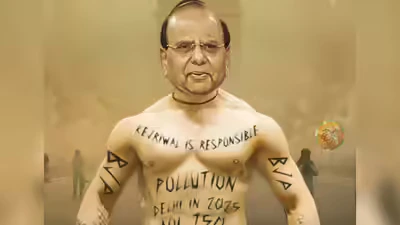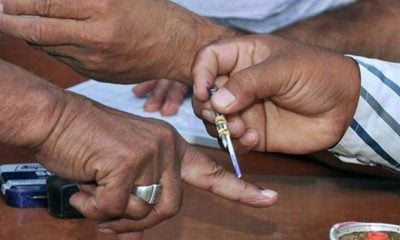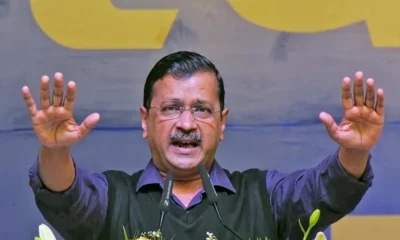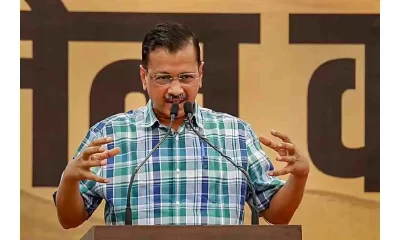The sit-in protest by Delhi Chief Minister Arvind Kejriwal and three of his ministers inside the Lt Governor’s Secretariat entered the second day today (Tuesday, June 12).
Kejriwal and three of his cabinet colleagues spent Monday night at Raj Niwas in protest against what they called the inaction by Lt Governor Anil Baijal in ordering the bureaucrats to end their four-month “strike”.
One of the ministers, Satyendra Jain, has launched an indefinite fast.
They are demanding L-G Anil Baijal to act against agitating IAS officials and approve the doorstep delivery of ration, a pet project of the AAP government.
Following a brief meeting with Baijal at 5.30 pm on Monday, Kejriwal, Deputy CM Manish Sisodia, PWD Minister Satyendra Jain and Labour Minister Gopal Rai refused to leave the waiting room of the L-G office.
Kejriwal, Manish Sisodia, Satyendar Jain and Gopal Rai, who slept on the sofas in the waiting room at Raj Niwas, had asked Baijal to direct that all IAS officers who did not return to work would have proceedings initiated against them and, if necessary, ESMA would be invoked against them.
Kejriwal alleged that the Prime Minister’s Office (PMO) and the L-G were instigating an officers’ “rebellion” against the elected government by “coordinating” the ongoing agitation that started after the alleged assault on Chief Secretary Anshu Prakash on February 19.
Baijal, for his part, maintained that while there was no strike, the atmosphere of mistrust between the state government and bureaucracy continued and “no sincere attempts to resolve the differences have been made so far by AAP government”. Baijal also alleged that in a meeting with the Delhi ministers on Monday evening, he was “threatened” by Kejriwal. Baijal said the demand that IAS officer be summoned to Raj Niwas and ordered to end the so-called strike was not desirable because he had already spoken to the bureaucrats in this regard.
The Raj Niwas issued a statement alleging that the CM “threatened” the L-G, demanding that he summon the officers at Raj Niwas and end the “so-called strike”, reported The Indian Express (IE).
“In response, it was reiterated by L-G that there is no strike and in his continued interactions with officers, it has been informed that the atmosphere of mistrust and fear continues and no sincere attempts to resolve the differences have been made so far,” the statement said, adding that it was in the sequence of “dharna without any reason”.
This morning, the four protesters sent a letter to Baijal, saying if the IAS officers did not end their “strike”, the Delhi government would be forced to turn to a law that punishes those who disrupt essential services.
Sisodia posted the letter in tweets.
AAP alleges that work has been affected because the officers have been on a protest against the Kejriwal government and have been boycotting meetings since Chief Secretary Anshu Prakash alleged in February that he was assaulted by AAP lawmakers during a meeting at the Chief Minister’s home.
The officers, however, deny any strike. The officers have restricted themselves to written communication with the political executive since the alleged attack on the Chief Secretary by AAP MLAs at the Chief Minister’s residence in February. The L-G had denied that the officers are on strike, in a statement on Monday. Raj Niwas had also stated the file pertaining to the delivery of rations is pending with the Food and Civil Supplies Minister, not the L-G.
Kejriwal has pledged to stay put at the Lieutenant Governor’s until he acts against the officers.
“In the history of independent India, this is the first time that IAS officers on strike for four months. Why?” the Chief Minister questioned yesterday, accusing Baijal of refusing to help.
Sisodia said that he met and wrote to Lt Governor Anil Baijal five times about the strike but he did “nothing” to end it.
The AAP government in Delhi has been clashing with the Lt Governor for months, accusing him of acting like the centre’s agent. They have also launched a campaign for full statehood for the capital, with the slogan: “L-G, Delhi Chhodo (Lieutenant Governor, Quit Delhi)”.
The AAP government accuses the centre of trying to rule Delhi using the Lieutenant Governor, who has to sign off on all decisions taken by Kejriwal and his ministers.


 Latest world news13 hours ago
Latest world news13 hours ago
 Latest world news13 hours ago
Latest world news13 hours ago
 Latest world news13 hours ago
Latest world news13 hours ago
 India News13 hours ago
India News13 hours ago
 India News4 hours ago
India News4 hours ago
 Latest world news4 hours ago
Latest world news4 hours ago














